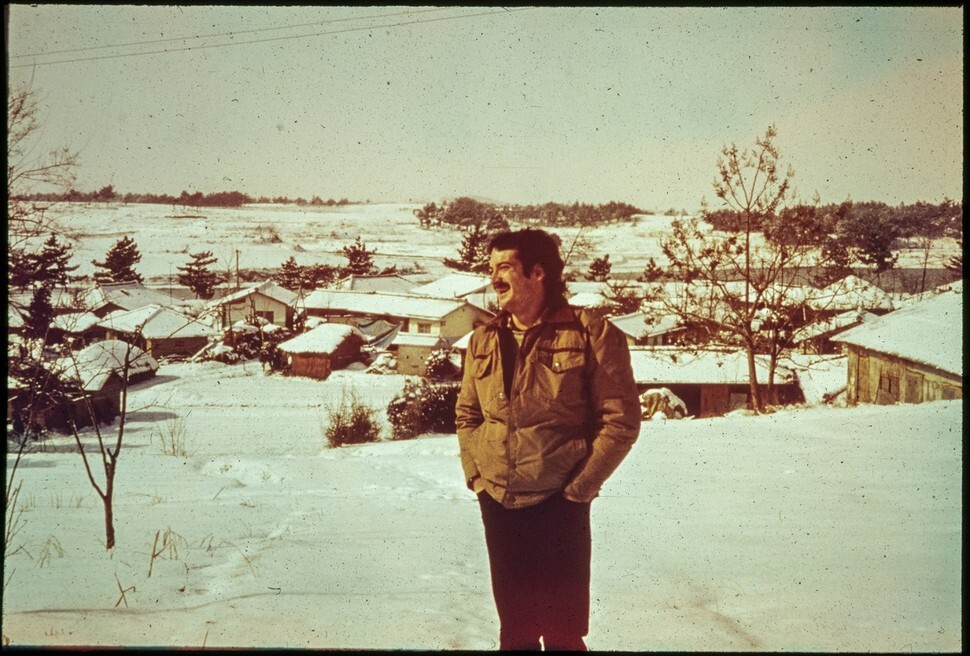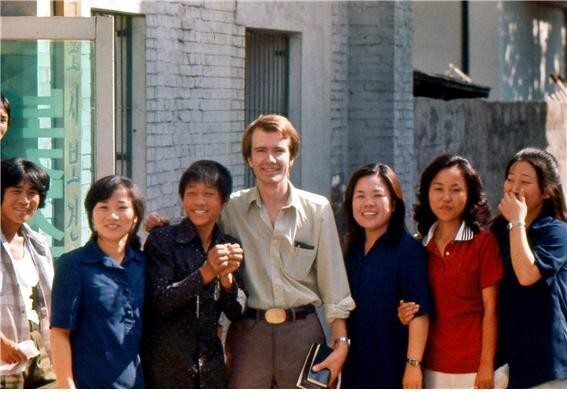hankyoreh
Links to other country sites 다른 나라 사이트 링크
Foreign witnesses of Gwangju Democratization Movement to attend commemoration ceremony

For the 40th anniversary of the Gwangju Democratization Movement, foreign witnesses are visiting Gwangju to share their memories of the struggle.
“Around 10 Americans and Germans, including four US Peace Corps members who stayed in Gwangju during May 1980, are scheduled to attend a May 18 40th anniversary commemoration ceremony on May 17,” the May 18 Memorial Foundation announced on Feb. 17.
“They will also be attending the Gwangju Asia Forum at Kim Dae-jung Convention Center in Gwangju beginning on May 19,” it added.
The former Peace Corps members who are scheduled to attend are Paul Courtright, David Dolinger, Donald Baker, and William Amos. Also coming to Gwangju is Linda Lewis, who was a Columbia University graduate student conducting anthropology research at Chonnam National University at the time.
The visitors have been recognized for their contributions in actively sharing the situation in Gwangju with the outside and helping change the position of the US government, which previously viewed the events of May 1980 as a “riot.” Dolinger and Courtright ignored the US embassy’s orders to leave Gwangju immediately, opting instead to support Gwangju residents by assisting with foreign press coverage. Baker, who arrived in Gwangju on May 28, 1980, eluded military surveillance to send photographs of Gwangju taken by Rev. Charles Huntley (who passed away in 2017) back to the US.

Lewis shared details of the Gwangju struggle in a 1987 publication titled “The 'Kwangju Incident' Observed: An Anthropological Perspective on Civil Uprisings.” Amos published “The Seed of Joy” in 1999 as the first overseas fiction work based on the events of May 1980 in Gwangju.
While the US embassy took a dim view of the Peace Corps volunteers who ignored the evacuation order at the time, it later said in June 1980 that they had established a positive image for Americans through the non-violent involvement, and that the US was “proud” of them.
The efforts by former Peace Corps members to share the story of May 1980 continue. Dolinger and Courtright are awaiting publication of a book they co-wrote recalling their experiences during the events in Gwangju, while Baker researches South Korea and May 1980 as chair of the Korean language program at the University of British Columbia.
“David Dolinger is deeply attached to Gwangju, to the point where he said that he wants to be buried in the May 18 cemetery when he dies. Most of the Peace Corps volunteers feel the same way,” said Choi Yong-ju, a researcher for the May 18 Memorial Foundation.
“This forum will be an opportunity to hear things we hadn’t encountered before about the experiences of foreigners during May 1980,” Choi added.
By Kim Yong-hee, Gwangju correspondent
Please direct comments or questions to [english@hani.co.kr]

Editorial・opinion
![[Column] Season 2 of special prosecutor probe may be coming to Korea soon [Column] Season 2 of special prosecutor probe may be coming to Korea soon](https://flexible.img.hani.co.kr/flexible/normal/500/300/imgdb/original/2024/0426/3317141030699447.jpg) [Column] Season 2 of special prosecutor probe may be coming to Korea soon
[Column] Season 2 of special prosecutor probe may be coming to Korea soon![[Column] Park Geun-hye déjà vu in Yoon Suk-yeol [Column] Park Geun-hye déjà vu in Yoon Suk-yeol](https://flexible.img.hani.co.kr/flexible/normal/500/300/imgdb/original/2024/0424/651713945113788.jpg) [Column] Park Geun-hye déjà vu in Yoon Suk-yeol
[Column] Park Geun-hye déjà vu in Yoon Suk-yeol- [Editorial] New weight of N. Korea’s nuclear threats makes dialogue all the more urgent
- [Guest essay] The real reason Korea’s new right wants to dub Rhee a founding father
- [Column] ‘Choson’: Is it time we start referring to N. Korea in its own terms?
- [Editorial] Japan’s rewriting of history with Korea has gone too far
- [Column] The president’s questionable capacity for dialogue
- [Column] Are chaebol firms just pizza pies for families to divvy up as they please?
- [Column] Has Korea, too, crossed the Rubicon on China?
- [Correspondent’s column] In Japan’s alliance with US, echoes of its past alliances with UK
Most viewed articles
- 1After election rout, Yoon’s left with 3 choices for dealing with the opposition
- 2AI is catching up with humans at a ‘shocking’ rate
- 3Noting shared ‘values,’ Korea hints at passport-free travel with Japan
- 4Why Kim Jong-un is scrapping the term ‘Day of the Sun’ and toning down fanfare for predecessors
- 5Two factors that’ll decide if Korea’s economy keeps on its upward trend
- 6South Korea officially an aged society just 17 years after becoming aging society
- 7Korea’s 1.3% growth in Q1 signals ‘textbook’ return to growth, says government
- 8Is Japan about to snatch control of Line messenger from Korea’s Naver?
- 91 in 5 unwed Korean women want child-free life, study shows
- 10[Reportage] On US campuses, student risk arrest as they call for divestment from Israel